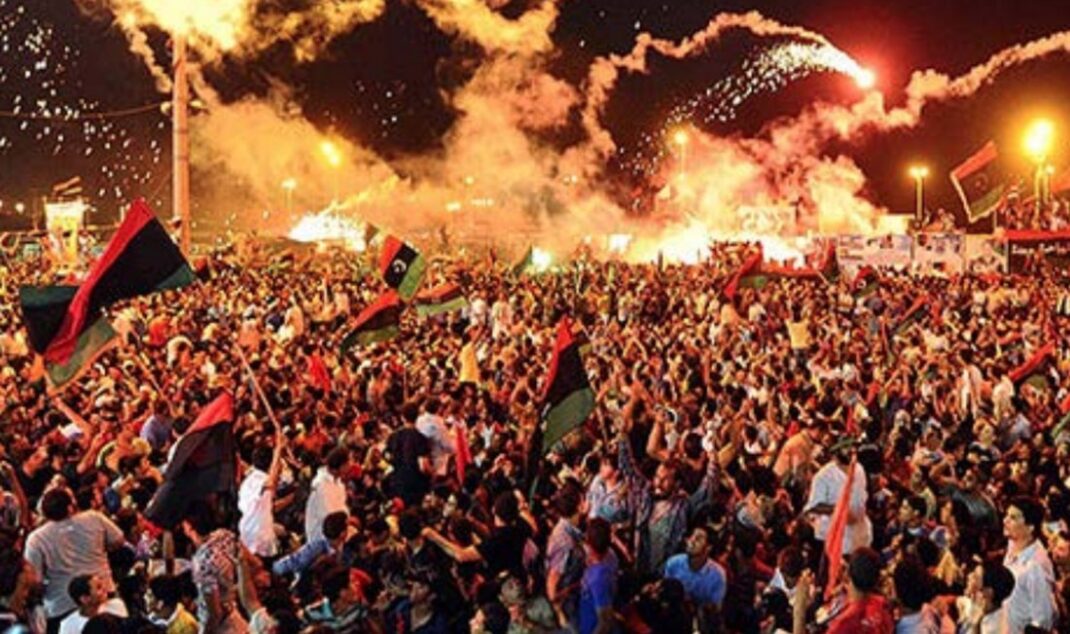Editors: Nadja Berghoff and Anas El-Gomati

 A decade on from the February 17th revolution, how the global disorder transformed Libya into a battleground for interest, ideology and influence.
A decade on from the February 17th revolution, how the global disorder transformed Libya into a battleground for interest, ideology and influence.
Chapter 3
United Kingdom: Navigating Uncertainty
By Peter Millett
 History is important across the Middle East and North Africa and Libya is no exception.
History is important across the Middle East and North Africa and Libya is no exception.
The graves of over 10,000 British soldiers, airmen and sailors in Tripoli, Benghazi and Tobruk pay testament to the British military’s role in the Second World War in North Africa.
And the fact that those cemeteries are beautifully preserved and respected also pays testament to the lasting memories for Libyans of the sacrifices made by the British during that conflict.
Historical ties between the two nations endured following the establishment of the Kingdom of Libya when Libya won its independence on 24 December 1951.
The United Kingdom supported the Libyan state during this period when oil revenues were low and the administration of the country needed support.
That relationship collapsed in 1969 when Gaddafi came to power in a bloodless coup.
Despite spending 9 months of military training in England, Gaddafi had no affection for Britain. He moved quickly to demand the removal of British (and American) military bases, nationalized the hydrocarbon concessions of British Petroleum and withdrew approximately US$550 million invested in British banks.
Gaddafi’s association with Soviet Russia and support for Arab nationalism also conflicted with British policy during the Cold War.
The 1980s saw a sharp deterioration in relations as the Gaddafi regime began to assassinate Libyan dissidents living in the UK. The murder of PC Yvonne Fletcher in 1984, when Libyan diplomats opened fire on protesters outside the Libyan mission in St James’ Sq led to the breakdown of diplomatic relations until 1999.
The Gaddafi’s regime’s violations of diplomatic norms and use of violence on British soil meant that former British Prime Minister Thatcher responded positively to President Reagan’s request to allow the US Air Force to use its British bases to attack Tripoli in 1986, in retaliation for a bomb attack on a discotheque in Berlin that was frequented by Americans.
The bombing of a Pan Am Boeing 747, which crashed over the Scottish town of Lockerbie in 1988 killing a total of 270, passengers, crew and people on the ground was also attributed to the Gaddafi regime.
Underpinning the antipathy between the countries’ leaders was Gaddafi’s active support for the Irish Republican Army (IRA) 3 . During the 1970s and 1980s, Gaddafi supplied large quantities of weapons and explosives including machine guns, rifles, pistols, rocket-propelled grenades, surface to air missiles and Semtex explosive.
These weapons were used to carry out terrorist outrages in Northern Ireland and England.
Diplomatic relations were restored in 1999 and the relationship began to warm as Gaddafi needed western support to modernise his economy. Following his announcement that Libya would abandon its weapons of mass destruction programmes, Prime Minister Tony Blair travelled to Tripoli in 2004 and met Gaddafi declaring a new relationship between the countries.
The Libyan revolution in 2011 would change this. Following Gaddafi’s violent suppression of protests across Libya, Prime Minister David Cameron joined President Sarkozy of France in pushing for military intervention.
In March 2011, the UK drafted and secured the adoption of United Nations Security Council Resolution 1973 which allowed “all necessary measures” to be used to protect civilians.
Two days later the UK and France launched air attacks on Gaddafi’s forces, supported by American missiles.
As the conflict in Libya wore on, the UK froze Gaddafi’s assets and expelled Libya’s ambassador, transferring diplomatic recognition to the National Transitional Council, the nascent political opposition in eastern Libya.
Following Gaddafi’s defeat, Cameron and Sarkozy visited Tripoli and Benghazi to celebrate the end of the Gaddafi regime. They reassured the Libyan people that they would support them in restoring stability and prosperity to their country after 42 years of dictatorship.
The British government offered significant programmes of support, including capacity building in government and in security sector reform, though Libya’s 2014 civil war and the subsequent institutional divisions saw a shift in foreign policy from technical assistance and state building to diplomacy and peace building.
In 2017, Prime Minister Boris Johnson, then Foreign Secretary visited Libya twice, meeting Prime Minister Serraj in Tripoli, the President of the House of Representatives Aguila Saleh in Tobruq and General Khalifa Haftar in Benghazi. He offered strong support for the UN-led political process.
Following the selection of a new Presidency Council and Prime Minister, Prime Minister Boris Johnson has renewed that commitment, calling the new UN backed Prime Minister Abdulhamid Debaiba to assure him of his support.
UK Foreign Policy
Since World War II, British Foreign Policy has been trying to adjust to the fact that Britain is no longer a superpower. The economic burden of rebuilding the country, the slow disintegration of the British Empire and the humiliation of the failed Suez campaign all meant that UK diplomacy was seriously weakened.
The Cold War enabled London to forge a close alliance with Washington and with NATO partners in Europe. The European Union, during the years that the UK was a member, slowly tried to establish a co-ordinated and multilateral foreign policy but has largely failed, as individual capitals launched their own initiatives and pursued their unilateral interests.
The underlying objectives of Britain’s foreign policy concentrate on security, both of the home nation and of British interests and citizens overseas. The threat to British interests from weapons of mass destruction and a desire to be a close partner with the USA drew the UK into conflicts in Iraq and Afghanistan in the early 2000s, the legacy of which is still apparent.
The perceived failure of these interventions played a significant role in the UK’s response to the ‘Arab Spring’ in 2011.
The revolutions in Tunisia and Egypt were watched with fascination in London where diplomats and politicians saw the toppling of dictatorial regimes by popular movements as a positive development.
If the people wanted to remove their leaders, they should be allowed to do so without outside intervention. But if those leaders used violence against civilians to prop up their regimes, then the international community had a responsibility to protect those civilians.
The turmoil in the region raised the question of how to balance interests and values. Should our relations with a country be based on economic advantage, even if that country abuses the human rights of its citizens?
The concept that it was in the UK’s interests to promote its values was a useful soundbite, but it would not be easy to apply in practice. Nonetheless, championing democracy, freedom of expression, the rule of law and respect for human rights became central to foreign policy.
Other priorities raised their profile, such as climate change, biodiversity and protection for refugees and migrants. In addressing all these issues, the UK’s Foreign Office regarded partnerships as a vital platform for achieving change.
The UK could not solve problems by itself. Working with like-minded countries, in Europe, Asia and North America was crucial. These drivers formed the backdrop to the UK’s approach to Libya, both during the Gaddafi era and thereafter. Relations with Gaddafi were driven primarily by security.
Once those security issues had subsided, economic interests came to the fore. The approach to the 2011 revolution was partly driven by security, but the military doctrine had shifted away from putting boots on the ground.
It was also important to work with partners, not only France and the USA, but other NATO partners and countries from the Arab world such as Qatar and the United Arab Emirates who joined the campaign.
Following the revolution, the UK’s strategy has been based on three main objectives: stability in a country on the edge of Europe, preventing the growth of terrorism, and the need to tackle the plight of migrants crossing the Mediterranean to Europe.
The link between terrorism and Libya was highlighted by terrorist attacks in neighbouring Tunisia in 2015 when 22 foreign tourists were killed at the Bardo Museum and 38 tourists, including 30 British citizens killed in Sousse.
The Tunisian perpetrators were trained in Libya 5 . The May 2017 bombing of the Manchester Arena which killed 22 concert-goers was carried out by the son of a Libyan refugee.
London recognised that this terrorist threat had been exacerbated by the divisions caused by civil war in Libya, and that in order to tackle them, Libya required a stable and united government. The UK therefore strongly backed the efforts of the United Nations to find a political solution to the divisions in the country since 2014.
British diplomats played a role in Skhirat in 2015 where the Libya Political Agreement was negotiated, working with European, American and regional representatives to encourage the Libyans present to work towards compromise.
They also played a role, both with other international partners and by lobbying Libyan domestic actors years later, in helping to implement the ‘Berlin Process’ that culminated in the selection of the latest Presidency Council and Government of National Unity in February 2021.
The UK’s policies are not without its critics. Many observers complained that the military action in 2011 was not followed up with an effective plan to help Libyans adapt to new leadership.
As Alistair Burt, who was Foreign Office Minister at the time commented: “We rushed to build capacity to enable the new government to govern. But it was all done in the absence of a political settlement which reflected both the interests of the warring elites and the aspirations of the Libyan population. We should have prioritised the politics over technocratic state-building.”
Some officials and politicians have also suggested that the UK should “pick winners”, ie back a specific individual or group such as Khalifa Haftar. This approach was rejected. The UK maintained relations with all the key players, including Haftar and tried to encourage them all to compromise and return to the political process led by the UN.
The UK also played a strong role at the United Nations in New York where the UK delegation “holds the pen” on Libya, ie produces the first drafts of resolutions,
statements for the Security Council. This role proved problematic in 2019 when a UK-drafted resolution calling for an end to Haftar’s bombardment of Tripoli met resistance, including from countries formerly regarded as partners.
Conclusion
In the last 2-3 years, the UK’s political machinery has been dominated by Brexit and Covid; there has been limited bandwidth for active engagement overseas. That is now beginning to change and the British government wants to play a significant role on the world stage, for example in this year’s G7 Presidency and the Chairmanship of the UN Climate Change Conference in Glasgow in December.
The UK will continue to play a constructive and supportive role to the UN in implementing the agreement reached in Geneva by the Libya Political Dialogue Forum and in supporting the key aim of a new Libyan government to organise elections in December.
Drafting and negotiating a Security Council resolution to legitimise the outcome and cement the ceasefire will be an important part of the UK’s support.
The British Ambassador and his team in Tripoli can also play a supportive role with key Libyan actors on the ground in designing and implementing programmes to help build capacity in Libya’s political, security and economic institutions to help bring stability and prosperity to the Libyan people.
The economic element of this approach is important. The three main Libyan economic institutions, the National Oil Corporation, the Central Bank and the Libyan Investment Authority all have strong links with the UK.
Any unity government will have to prioritise public services, infrastructure and modernising oil production to create a more sustainable economic base. British companies can be part of that work.
***
Peter Millett is a retired British diplomat who served as British Ambassador to Libya from 2015 to 2018. During that time he played a role in supporting the UN’s efforts to negotiate and then implement the Libya Political Agreement. He met and built relationships with the key political, security and economic players in Libya and in the international community. He also managed the return of the British Embassy from Tunis to Tripoli. Before Libya, he was British Ambassador to Jordan from 2011 to 2015 and High Commissioner to Cyprus from 2015 to 2010. Earlier in his career he had diplomatic postings in Venezuela, Qatar, Brussels and Athens.
Nadja Berghoff – Programs and Communication Fellow at Sadeq Institute.
Anas El-Gomati – Director, Libya’s 1st think tank. Chief contributor Security & Governance.
____________





